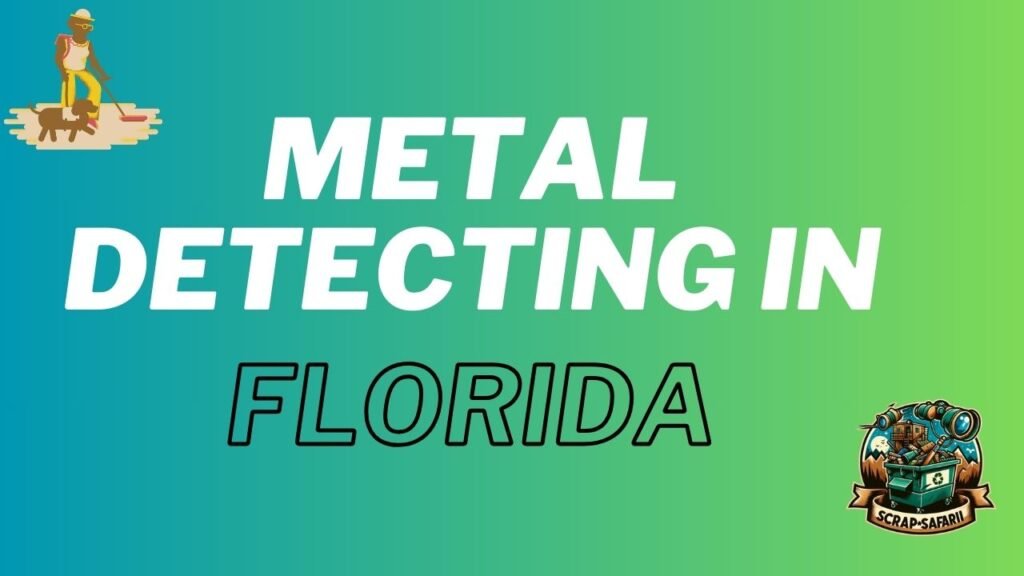The warm sands of Florida’s sun-drenched beaches hold the promise of buried treasure waiting to be discovered. From Spanish galleons laden with gold to modern-day valuables lost by beachgoers, the Sunshine State is a metal detectorist’s paradise. Metal detecting is an exhilarating hobby that combines adventure, history, and the thrill of the hunt.
This exciting pastime allows you to unearth relics from the past while enjoying the great outdoors. Whether you’re a seasoned pro or a newcomer to the hobby, Florida offers an abundance of opportunities to seek out lost coins, jewellery, and historical artifacts. With its rich maritime heritage and diverse landscapes, the state is a metal detector’s playground.
In this comprehensive guide, we’ll delve into the world of metal detecting in Florida. From navigating the legal landscape to uncovering the best locations and techniques, we’ll equip you with the knowledge and expertise to embark on your treasure-hunting adventures. Get ready to uncover the secrets buried beneath Florida’s sandy shores and lush landscapes.
Metal Detecting Laws and Regulations in Florida
Metal detecting is legal in Florida, but some specific laws and regulations must be followed. At the state level, the Florida Bureau of Archaeological Research governs metal-detecting activities on public lands. A permit is required for any metal detecting activities on state-owned lands, including parks, forests, and archaeological/historical sites.
For public beaches, metal detecting is generally allowed, but local city or county ordinances may restrict certain areas or set specific times when the activity is permitted. It’s essential to check with local authorities before metal detecting on public beaches.
On private property, metal detecting is only allowed with the explicit permission of the landowner. Trespassing on private land without consent is illegal and can result in fines or even criminal charges.
There are strict laws in place regarding the discovery of historical artifacts or human remains. If you uncover any potential archaeological finds, you are legally required to notify the authorities immediately and leave the items undisturbed. Keeping or selling artifacts without proper permits can lead to severe penalties, including fines and potential jail time.
It’s crucial to familiarize yourself with all applicable laws and regulations before engaging in metal detecting activities in Florida. Ignorance of the law is not a valid excuse, and violations can result in hefty fines, confiscation of equipment, and even criminal charges in extreme cases.
Best Locations for Metal Detecting in Florida
Florida’s diverse landscape offers a wealth of promising sites for metal detectorists to explore. From sun-drenched beaches to historic parks and abandoned ghost towns, the Sunshine State is a true treasure hunter’s paradise.
Beaches: With over 1,350 miles of coastline, Florida’s beaches are a prime destination for metal detecting. The constant ebb and flow of tides, combined with high foot traffic, make these sandy stretches a haven for lost coins, jewelry, and other valuable finds. Popular spots include Pensacola Beach, Daytona Beach, and the beaches of the Florida Keys.
Parks and Recreation Areas: State and national parks, as well as local recreational areas, can yield exciting discoveries for metal detectorists. These locations often have a rich history and may have seen battles, encampments, or other significant events. Some notable sites include De Soto National Memorial, Castillo de San Marcos National Monument, and the Alafia River State Park.
Historical Sites and Ghost Towns: Florida’s storied past has left behind numerous abandoned settlements, forts, and battlegrounds, many of which are open to responsible metal detecting. These sites offer the potential for uncovering Civil War relics, Spanish colonial artifacts, and other pieces of history. Explore places like Fort Pickens, Fort Clinch State Park, and the ghost town of Eldora.
Abandoned Structures: From forgotten homesteads to crumbling commercial buildings, abandoned structures can be treasure troves for metal detectorists. However, it’s crucial to obtain permission from property owners and exercise caution when exploring these sites. Some promising areas include the Florida Panhandle and the Everglades region.
Private Property (with Permission): While public lands are the most accessible, private properties can also be fruitful for metal detecting, provided you obtain explicit permission from the landowner. This could include farmlands, ranches, or even residential properties with a rich history. Building positive relationships with property owners is key to gaining access to these potentially rewarding sites.
Choosing the Right Metal Detector
When it comes to metal detecting in Florida, having the proper equipment can make a significant difference in your success rate. The state’s unique soil composition, mineralization levels, and environmental conditions require detectors specifically designed to handle these challenges. Additionally, the right accessories and gear will ensure your comfort and safety during long hours spent in the Florida heat and humidity.
For beach hunting, waterproof metal detectors are essential. Models like the Minelab Excalibur II, Garrett Sea Hunter, and Nokta Makro Kruzer are excellent choices, as they can withstand saltwater exposure and operate effectively in wet sand. These detectors often feature discrimination modes tailored for separating valuable targets from trash items commonly found on beaches.
If you plan to explore inland areas, such as parks, historical sites, or abandoned structures, consider high-frequency detectors like the Minelab Equinox or Garrett AT Pro. These models excel at separating good targets from mineralized soil and can penetrate deeper into the ground, increasing your chances of uncovering buried treasures.
In addition to the metal detector itself, several accessories can enhance your detecting experience. A pinpointer, for instance, can precisely locate a target once your primary detector has identified an area of interest. Sand scoops and hand trowels are invaluable for digging in loose soil or sand, while headphones allow you to better hear faint target signals and block out external noise.
Proper clothing and gear are also crucial for comfortable and safe metal detecting in Florida’s often sweltering conditions. Lightweight, moisture-wicking fabrics, a wide-brimmed hat, and sunscreen are essential for protecting against the intense sun. Sturdy, waterproof footwear with good traction will keep you steady on uneven terrain and prevent slips in wet or muddy areas. Lastly, stay hydrated by carrying plenty of water and taking breaks in the shade when needed.
Metal Detecting Techniques for Florida
Researching potential metal-detecting sites is crucial in Florida. Study old maps, historical records, and local lore to identify areas that may have seen human activity in the past. Parks, beaches, ghost towns, and homestead sites are all promising locations to explore.
When metal detecting in Florida’s mineralized soil conditions, it’s important to adjust your detector’s settings appropriately. Increase the sensitivity and use discrimination modes to filter out unwanted targets like bottle caps and pull tabs. The salt content in coastal areas can also impact detector performance, so tweak your settings accordingly.
Mastering proper sifting and digging techniques is essential. Use a hand trowel or sand scoop to carefully extract potential targets. In grassy areas, remove plugs neatly and replace them to minimize environmental impact. For beach hunting, skim the detector over the sand and dig quickly to avoid losing small finds in the shifting terrain.
Target identification and discrimination skills are invaluable assets. Listen closely to the detector’s audio tones and watch the target ID numbers to separate junk items from potential treasures. Periodically check your discrimination patterns and adjust settings to improve your results.
Beach and water hunting present unique challenges but can yield incredible finds. Use a waterproof detector rated for salt water environments. Scan the dry sand as well as the area where waves roll in and out. Be cautious of holes, drop-offs, and other hazards. Follow proper recovery techniques to avoid losing targets in the surf.
Notable Metal Detecting Finds in Florida
From Spanish galleons laden with New World treasures to Native American artifacts dating back thousands of years, Florida’s storied past has left an incredible array of valuable relics waiting to be discovered by modern metal detectorists. The state’s unique history as a crossroads of cultures, along with its coastal location that saw many shipwrecks, makes it an incredibly rewarding place to hunt for buried riches.
One of the most prized finds in Florida are Spanish coins, jewels, and artifacts from the treasure fleets that sank during hurricanes in the 1600s and 1700s. Detectorists have uncovered thousands of Spanish reales, doubloons, and pieces of eight worth millions over the years. The 1715 Plate Fleet and 1733 Spanish Treasure Fleets are among the most famous shipwreck sites that still yield incredible bounties.
Florida’s indigenous peoples also left behind a rich material heritage for modern explorers to find. Arrowheads, stone tools, pottery shards, and other Native American artifacts turn up regularly, especially in inland areas along former settlement sites and travel routes. Pieces from the Timucua, Calusa, Tequesta, and other tribes connect modern relic hunters to the deep history of Florida’s first inhabitants.
The state’s strategic importance in the American Revolution, Civil War, and Spanish-American War also means military artifacts and relics from these conflicts are commonly unearthed. Musket balls, bullets, buckles, buttons and other personal effects from soldiers and camps get dug up regularly at former battlefields and encampment sites across Florida. Relic hunters have even found rare pieces like swords, cannonballs, and insignia.
But you don’t have to go back centuries to find incredible treasures in the Sunshine State. Detectorists also routinely pull up modern valuables like gold rings, jewelry, watches, and coins from beaches and parks. With Florida’s balmy weather and tourism, plenty of recent riches are waiting to be rediscovered just under the surface. Metal detecting has a way of uncovering history in unexpected ways!
Connecting with the Florida Metal Detecting Community
One of the joys of metal detecting is being part of an enthusiastic community of treasure hunters. In Florida, many clubs, forums, and events allow you to connect with fellow detectorists, share tips, and even find a mentor.
Metal Detecting Clubs in Florida: Joining a local metal detecting club is an excellent way to learn from experienced hobbyists and gain access to group hunts and meetings. Some of the most active clubs in Florida include:
- Florida Treasure Hunter’s Club (Tampa)
- Gold Coast Treasure Club (Fort Lauderdale)
- Treasure Coast Archaeological Society (Port St. Lucie)
- Central Florida Metal Detecting Club (Orlando)
Online Forums and Facebook Groups: The internet has made it easier than ever to connect with the metal detecting community. Popular online forums include TreasureNet, Friendly Metal Detecting Forums, and 707 Treasure Hunters Forum. Facebook also has many active groups like Florida Metal Detecting and Treasure Hunters.
Meetups and Events: Keep an eye out for metal detecting events, competitions, and group hunts organized across Florida. These are excellent opportunities to learn new techniques, explore different sites, and potentially uncover valuable finds with other detectorists.
Mentoring and Training: Many experienced metal detectorists in Florida offer mentoring services or training courses for those new to the hobby. A knowledgeable mentor can teach you proper techniques, help you identify targets, and provide guidance on the best locations to search.
Frequently Asked Questions about Metal Detecting in Florida
Do I need a permit for metal detecting in Florida?
In most cases, you do need a permit to go metal detecting on public lands in Florida. The requirements vary depending on the specific location and managing agency. State parks typically require a permit, while some county parks allow metal detecting without one. Always check the local regulations before you start detecting.
Can I keep what I find while metal detecting in Florida?
What you can legally keep depends on where you are metal detecting and what you find. On public lands like parks and beaches, you can generally keep modern items like coins, jewelry, and other non-historic objects. However, any archaeological artifacts or historic finds belong to the state or landowner and must be properly reported. On private property with the owner’s permission, the finds may belong to you or have to be split.
What should I do if I find a historic or valuable artifact??
If you discover any artifacts that appear to be historically significant while metal detecting in Florida, it’s crucial to leave them in place and notify the proper authorities immediately. Taking or keeping such finds is illegal and can result in severe penalties. Document the location, take photos, and contact the local archaeological society or the Florida Bureau of Archaeological Research.
Are there any metal detecting clubs in Florida I can join?
Yes, Florida has a vibrant community of metal detecting clubs and organizations you can join. Some of the largest include the Florida Association of Metal Detecting Clubs, the Central Florida Metal Detecting Club, and the Treasure Coast Archaeological Society. Joining a club provides access to group hunts, meetings, expertise sharing, and connections with other local detectorists.
What are the best beaches for metal detecting in Florida?
With over 800 miles of beautiful beaches, Florida offers countless opportunities for beachcombing and metal detecting. Some of the most popular and productive beaches for detectorists include Pensacola Beach, St. Augustine Beach, Clearwater Beach, Miami Beach, and the Treasure Coast beaches. These areas have a rich history of shipwrecks, battles, and tourism, increasing the chances of finding interesting and valuable items.
Conclusion
Metal detecting in Florida offers a thrilling opportunity to uncover hidden treasures and connect with the state’s rich history. From sun-drenched beaches to historic parks, the Sunshine State abounds with promising sites to explore with your metal detector. Remember to always follow local laws, obtain necessary permits, and respect private property.
As you embark on this adventure, be prepared with the right equipment and techniques suited for Florida’s unique environment. Join local clubs and online communities to learn from experienced detectorists and stay updated on the latest finds and events. Most importantly, embrace the thrill of the hunt while practicing ethical and responsible detecting.
Whether you’re a seasoned treasure hunter or just starting out, metal detecting in Florida promises an exciting hobby that combines exploration, patience, and a touch of luck. So grab your gear, study those hot spots, and get ready to unearth Florida’s buried riches. Who knows what incredible artifacts or valuable relics await your next sweep? The possibilities are endless for those willing to dig a little deeper.

Emma Youell is a passionate metal detectorist hailing from Kent, UK. With a deep-seated love for history and a keen eye for uncovering relics of the past, Emma’s adventures extend beyond metal detecting to beachcombing and fossil hunting. By day, she channels her creativity into motion design and videography, bringing stories to life through her work at @emma.motion. Her enthusiasm for history shines through her social media presence, where she shares her discoveries and insights under the handles @emloveoldstuff and @ehmahh. Emma is also a talented enamel pin designer, blending her love for history and design into unique pieces. Follow along as Emma takes you on a journey through time, unearthing hidden treasures and sharing the stories they hold.


